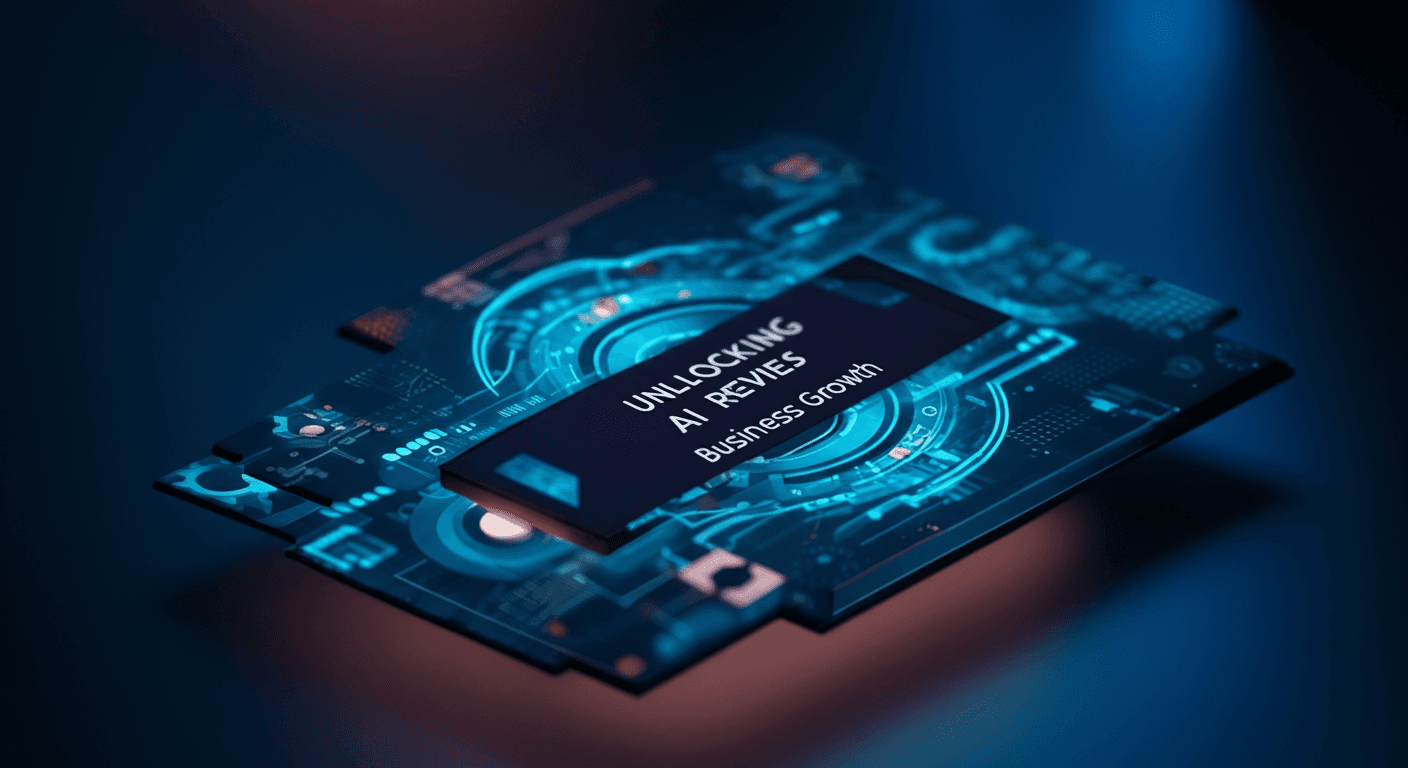AI-Powered Code Review: Boost Security, Quality, and Developer Productivity

Introduction: The Code Quality Imperative in the Age of AI
Modern software development is a beast of ever-increasing complexity, demanding more than ever before. Keeping code clean, secure, and efficient is no longer a "nice-to-have" but a critical business imperative.
Traditional Reviews Fall Short
Manual code reviews, the long-standing gatekeepers of quality, are increasingly strained.- They are time-consuming, diverting developers from active coding.
- Manual reviews are prone to human error; subtle bugs and security vulnerabilities can slip through the cracks.
- Scaling manual code reviews across large teams and codebases is a logistical nightmare.
AI Steps In: A New Paradigm
That's where AI-powered code review comes into play. It's not about replacing human reviewers but augmenting their capabilities to achieve unparalleled code quality.- Improved Security: AI can flag potential vulnerabilities with greater accuracy.
- Reduced Bugs: Automated analysis pinpoints common coding errors, leading to fewer bugs in production.
- Enhanced Developer Productivity: By automating tedious checks, AI frees up developers to focus on creative problem-solving.
Benefits Beyond the Obvious
AI code review offers a cascade of benefits:- Reduced technical debt, leading to easier maintenance and future development.
- Faster release cycles, enabling quicker delivery of features and updates.
- Improved team collaboration, with AI providing a common ground for discussions.
AI-powered code review is rapidly transforming software development by automating the tedious task of identifying code defects.
How AI Code Review Works: Unveiling the Magic
AI code review tools leverage a combination of technologies like machine learning (ML), natural language processing (NLP), and static analysis to understand and evaluate code.- Machine Learning for Code Analysis: AI models are trained on massive datasets of code, learning patterns and best practices. For example, an ML model can learn to identify common security vulnerabilities in Java code by analyzing thousands of open-source projects.
- NLP for Code Understanding: NLP allows AI to understand the meaning and context of code. Tools use NLP to identify logical errors and semantic inconsistencies that traditional static analysis might miss.
- Static, Dynamic, and Semantic Analysis: Different types of analysis cater to various code review needs:
AI-powered tools can detect various code defects, including security vulnerabilities, bugs, and style violations.
AI code review offers significant advantages, but addressing concerns about AI bias is critical for fairness and accuracy.
Mitigating AI Bias in Code Review
AI bias in code can occur if training data isn't diverse or representative. Mitigating this requires careful data curation, bias detection techniques, and ongoing monitoring to ensure fair and equitable code assessments.Embracing the Future of Code Quality
AI code review empowers developers to improve code quality, boost security, and increase productivity by automating and augmenting traditional code review processes. Explore the best code assistance AI tools to start your journey.AI-powered code review is rapidly transforming software development, boosting security, improving code quality, and dramatically increasing developer productivity.
Top AI-Powered Code Review Tools: A Comparative Analysis

Choosing the right AI-powered code review tool is critical for streamlining your development process. Here’s a detailed comparison of some leading platforms:
- DeepSource: This tool analyzes code in real-time, identifying potential bugs, security vulnerabilities, and performance issues. DeepSource offers integration with popular Git repositories, making it easy to incorporate into existing workflows.
- SonarQube: A widely-used open-source platform, SonarQube focuses on continuous inspection of code quality. It supports a wide range of languages and offers comprehensive reporting on code smells, bugs, and security vulnerabilities.
- Strengths: Extensive language support, detailed reports, and a large community.
- Weaknesses: Can be complex to set up and configure initially.
- Coverity: Now part of Synopsys, Coverity is a static analysis tool that identifies critical defects and security weaknesses early in the software development lifecycle. Its strength lies in its comprehensive static analysis capabilities.
- Codacy: Codacy automates code reviews and monitors code quality, helping teams improve their coding standards.
- Integrations: Offers seamless integration with popular IDEs (like VS Code and IntelliJ IDEA) and CI/CD pipelines such as Jenkins and GitHub Actions.
- Amazon CodeGuru: This tool uses machine learning to provide intelligent recommendations for improving code quality and identifying application performance bottlenecks. Amazon CodeGuru can be especially beneficial for teams building applications on AWS.
Ultimately, the best AI-powered code review tool depends on your specific needs and priorities. By carefully evaluating these tools based on features, pricing, ease of use, and integration capabilities, you can make an informed decision that will enhance your development process and improve the quality and security of your code. To find the best AI solutions check out best AI tools
AI-powered code review is rapidly transforming software development, delivering a compelling return on investment (ROI) through enhanced code quality and accelerated development cycles.
Benefits of Implementing AI Code Review: Quantifying the ROI

AI code review offers several tangible benefits that directly impact a company's bottom line:
- Reduced Bug Counts: AI-powered tools can identify potential bugs and vulnerabilities with greater speed and accuracy than traditional manual reviews. By catching defects early, companies can significantly reduce bug counts and related debugging costs. Studies have shown a 20-30% reduction in bug-related expenses by implementing automated code review. For example, Bugster.ai aims to automate bug detection to catch bugs early.
- Fewer Security Vulnerabilities: These tools can scan code for common security flaws, such as SQL injection and cross-site scripting (XSS). Preventing these vulnerabilities early can significantly reduce the risk of costly security breaches. Early detection also means less need for emergency patching.
- Faster Time-to-Market: By automating repetitive tasks, AI code review enables developers to focus on more complex problem-solving, accelerating the overall development timeline. This faster release cycle translates directly to a competitive advantage.
- Improved Developer Productivity: Code assistance AI tools like GitHub Copilot automate repetitive tasks, allowing developers to focus on more complex problem-solving. AI provides actionable feedback, reducing time spent on manual reviews and debugging. This boosts overall productivity.
- Reduced Technical Debt: Consistent code quality enforcement through AI code review minimizes the accumulation of technical debt. This translates to long-term cost savings associated with code maintenance and refactoring.
- Cost Savings: Preventing defects early in the development cycle translates into significant cost savings. The later a bug is found, the more expensive it is to fix. AI code review helps identify and eliminate these costly, late-stage bugs.
AI-powered code review is revolutionizing software development, offering unprecedented opportunities to enhance code quality and security.
Implementing AI Code Review: Best Practices and Strategies
Successfully integrating AI into code review requires careful planning and execution. It's not just about adopting a code assistance tool; it's about transforming your entire development workflow. AI code assistance tools help developers write and understand code, making the coding process more efficient.
- Establish Clear Coding Standards:
- Integrate AI Tools into Existing Workflows:
- Customize and Configure Tools:
- Address Challenges:
- Continuous Monitoring and Improvement:
Implementing AI code review is an ongoing journey, demanding a strategic and adaptive approach. By focusing on clear standards, thoughtful integration, and continuous improvement, organizations can realize the full potential of AI to elevate their code quality, security, and developer productivity. Make sure you check out the Software Developer Tools category for more options.
AI-powered code review is rapidly evolving to become a cornerstone of modern software development.
The Rise of Automated Code Analysis
AI is poised to revolutionize code review by automating tasks that are currently manual and time-consuming. For example, AI can automatically detect vulnerabilities using advanced analysis techniques, such as those potentially accelerated with GitHub Copilot, which offers AI-powered code suggestions and analysis. This tool assists developers in writing better code, which inherently reduces the number of errors that need to be caught during code review.Key Trends and Predictions
- Enhanced Vulnerability Detection: AI algorithms are becoming more sophisticated in identifying subtle vulnerabilities that human reviewers might miss. Automated tools can flag potential security risks, such as SQL injection flaws and cross-site scripting vulnerabilities.
- Automated Refactoring: We can anticipate AI's use in code generation and automated refactoring. ChatGPT, a conversational AI model, could be used to suggest and even implement code improvements automatically, reducing technical debt and enhancing code maintainability.
- Integration with AI-Powered Tools: Look for tighter integrations between AI code review tools and other AI-driven development aids. This includes seamless integration with IDEs, testing frameworks, and project management software.
Ethical Considerations and Responsible AI
As AI takes on more critical tasks in software development, it's crucial to address ethical implications. Responsible AI practices are needed to prevent bias and ensure fairness.In summary, AI in code review is set to transform how software is built, making it more secure, reliable, and efficient— all while demanding careful attention to ethical considerations as AI becomes more deeply integrated into the software development lifecycle. Next, we'll dive into practical applications of these tools.
AI-powered code review is revolutionizing software development, and it’s time to embrace its full potential.
Streamlined Benefits
AI-powered code review offers significant advantages:- Improved Code Quality: AI identifies bugs and vulnerabilities often missed by human reviewers. For example, Bugster.ai automatically detects and resolves bugs, ensuring cleaner code.
- Enhanced Security: AI scans for security flaws and potential exploits.
- Increased Developer Productivity: Automation frees developers to focus on innovation, as AI handles repetitive tasks.
Actionable Steps for Adoption
"Don't wait – integrate AI code review into your workflow today!"
Here's how to get started:
- Explore AI Tools: Try free trials of AI code review tools like GitHub Copilot.
- Start Small: Implement AI code review in a small project to understand its impact and refine your processes.
- Stay Updated: Keep up with the latest AI News and trends to leverage the best tools and techniques.
A Modern Imperative
AI code review isn't just a futuristic concept; it's a necessary component of modern software development, providing a competitive edge by improving code quality, security, and developer productivity. Explore Software Developer Tools to discover the right solutions for your team.Keywords
AI code review, automated code review, code quality, code security, static analysis, dynamic analysis, DeepSource, SonarQube, Coverity, Codacy, Amazon CodeGuru, software development, developer productivity, technical debt, vulnerability detection
Hashtags
#AICodeReview #CodeQuality #SoftwareSecurity #DevOps #AItools
Recommended AI tools
ChatGPT
Conversational AI
AI research, productivity, and conversation—smarter thinking, deeper insights.
Sora
Video Generation
Create stunning, realistic videos & audio from text, images, or video—remix and collaborate with Sora 2, OpenAI’s advanced generative app.
Google Gemini
Conversational AI
Your everyday Google AI assistant for creativity, research, and productivity
Perplexity
Search & Discovery
Clear answers from reliable sources, powered by AI.
Cursor
Code Assistance
The AI code editor that understands your entire codebase
DeepSeek
Conversational AI
Efficient open-weight AI models for advanced reasoning and research
About the Author

Written by
Regina Lee
Regina Lee is a business economics expert and passionate AI enthusiast who bridges the gap between cutting-edge AI technology and practical business applications. With a background in economics and strategic consulting, she analyzes how AI tools transform industries, drive efficiency, and create competitive advantages. At Best AI Tools, Regina delivers in-depth analyses of AI's economic impact, ROI considerations, and strategic implementation insights for business leaders and decision-makers.
More from ReginaWas this article helpful?
Found outdated info or have suggestions? Let us know!


